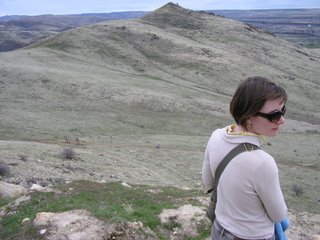Yesterday, I once again mentioned an intellectual project that I intend to take up with greater energy in the coming days and weeks. My aim is to begin tackling the problem of our society's dependence upon faith and religious dogma as authoritative sources on living moral and full lives. The project I hope to commence today, and continue throughout my life, will first and foremost involve the study of the origions of religion, the nature of faith (individual and societal), the arguments for and against religious faith, the philosophy surrounding ethics and morality, and the science of human happiness-if one can be found. Integral to my studies will be an analysis and critique of the logic-or lack of logic-in all the material I cover (or at least as much of the material as I can deconstruct without losing patience). This methodology will be the catalyst for whatever intellectual evolution I experience. If after a few years of in depth study, analysis, and logical evolution, I still hold my present views regarding religion's negative affects on the human condition; then I'll attempt to "enlighten" others about religion, faith, and a life without them both by whatever means I determine to be effective.
Kooky, huh? As crazy as my project seems, philosophers have tried to reconcile faith and science for ages. My passion for reform in this area is far from out of the ordinary. My thoughts are definately far from original. However, I'd say that my goal is less to reconcile faith and science, but to help push one out of our consciousness (faith) so that the other (science, reason) can finally grant a good system of morals the solid foundation its always lacked, and our lives can become more full and happy by living smarter, for the moment, for ourselves. The evil I want to see diminished is not moral axioms like "do unto others as you would have done to you"; but blinding, dividing, deligitamizing religiousity associated with such beautiful moral sentiments. I too would like to see an "end of faith".
To prove I'm not off my rocker, that others feel the same way I do, I want to share two quotes that I personally find very powerful and moving. The first is from "An Essay on Morals" by Philip Wylie:
"Ideas of God have unquestionably inspired men to noble deed and filled some few with conscience. Perchance these would have been generous and possible, anyway. But it is certain that up until this very day, God has been man's main excuse for failure. God is his moral alibi. And whether he is born a blank tablet or whether his impulses are stronger than all the wisdom he may get on earth, he cannot discover, while he serves in piety, his own imagination. For to the extent a man believes, he cannot seek; and so long as he prays, he is not trying his own best. The dignity which is his as an animal, and the genuine humility which has kept all other species honest, can no more belong to a worshiper of God than to Hitler, for God is an idol, man's own image, and human reverence is the fatuous awe of the ape with the mirror. Promises of Heaven, alone, keep men enduring their hellish earth-of Milk and Honey, of Immortal Peace, of German Supremacy, or World Workers owning the World, and Thirty Dollars every Thursday."
Ok, you've got to exuse Mr Wylie for his pomp-he's obviously
really into himself-but the book was written in 1947, and pomp was totally in then. Anyway, the words of Sam Harris do a better job of capturing the spirit of the topic:
"We do not know what awaits each of us after death, but we know that we will die. Clearly, it must be possible to live ethically-with a genuine concern for the happiness of other sentient beings-without presuming to know things about which we are patently ignorant. Consider it: every person you have ever met, every person you will pass in the street today, is going to die. Living long enough, each will suffer the loss of his friends and family. All are going to lose everything they love in this world. Why would one want to be anything but kind to them in the meantime?
We are bound to one another. The fact that our ethical intuitions must, in some way, supervene upon our biology does not make ethical truths reducible to biological ones. We are the final judges of what is good, just as we remain the final judges of what is logical. And on neither front has our conversation with one another reached an end. There need be no scheme of rewards and punishments transcending this life to justify our moral intuitions or to render them effective in guiding our behavior in the world. The only angels we need invoke are those of our better nature: reason, honesty, love. The only demons we must fear are those that lurk inside every human mind: ignorance, hatred, greed, and faith, which is surely the devil's masterpiece.
Man is manifestly not the measure of all things. This universe is shot through with mystery. The very fact of its being, and of our own, is a mystery absolute, and the only miracle worthy of the name. The consciousness that animates us is itself central to this mystery and the ground for any experience we might wish to call "spiritual". No myths need be embraced for us to commune with the profundity of our circumstances. No personal God need be worshiped for us to live in awe at the beauty and immensity of creation. No tribal fictions need be rehearsed for us to realize, one fine day, that we do, in fact, love our neighbors, that our happiness is inextricable from their own, and that our interdependence demands that people everywhere be given the opportunity to flourish."
I'd quote the whole book if I could-I definately encourage anyone and everyone to read "The end of Faith", but especially if you're a person of faith, otherwise its a bit like preaching to the choir.
I'm sure there's a lot I could edit in this blog, but its bedtime...










